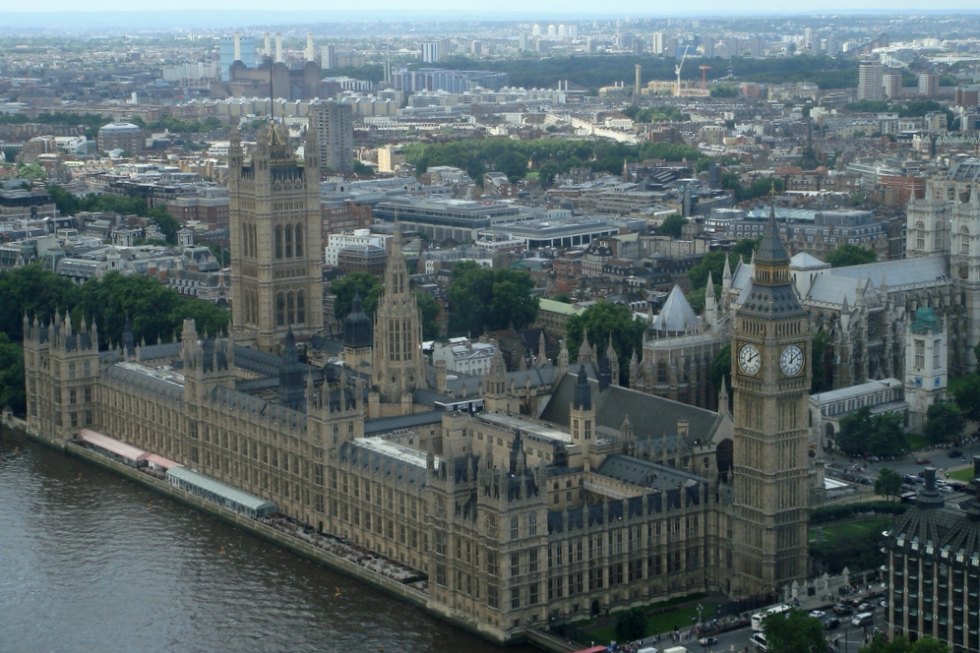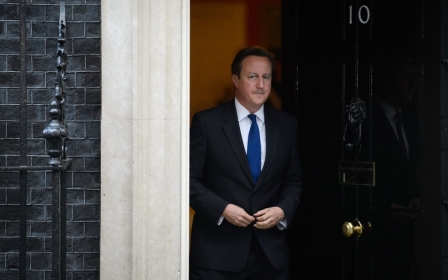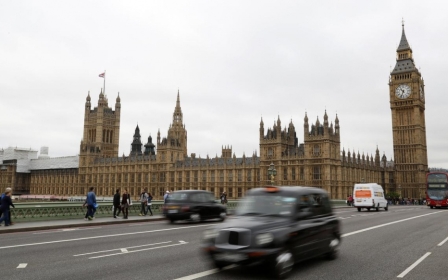Israel condemns UK parliament's Palestine recognition vote

Israel has criticised a vote by British lawmakers to recognise Palestine as a state. The motion was passed in a historic vote by a majority of 274 to just 12.
Though the move is not expected to change government policy, Israel expressed its concern on Tuesday that the move could "undermine peace prospects."
"Premature international recognition sends a troubling message to the Palestinian leadership that they can evade the tough choices that both sides have to make, and actually undermines the chances to reach a real peace," said a statement from the Israeli foreign ministry.
But senior Palestine Liberation Official Hanan Ashrawi said in a statement that it would "enhance the European voices calling for the recognition of the State of Palestine and will create the right environment for the international community to grant the Palestinian people legal parity and rights."
The House of Commons debate was watched around the world after Sweden drew anger from Israel this month for saying it would recognise Palestine.
It was initiated by backbencher Grahame Morris from the main opposition Labour party, who said Britain had a "moral responsibility" to act because of its history as colonial power in the region.
"It's absolutely clear that Israel-Palestine relations are stuck at an impasse, as is our foreign policy," Morris said, opening the debate.
"Both of these impasses must be broken. We hear a great deal of talk about the two-state solution but today, through validating both states, members will have the opportunity to translate all of that principled talk into action."
The vote is non-binding as it was initiated by a backbencher.
Members of the government, which backs a two-state solution, abstained from the vote, Prime Minister David Cameron's official spokesman said.
"We think that... you should do everything you can that's supportive of a successful and sustainable outcome based on a two-state solution," the spokesman told a regular press briefing.
The leaders of Morris's party, Labour, had said that MPs who were in the Commons when the vote took place must back it.
Neither Cameron nor Labour leader Ed Miliband were in the Commons chamber for the start of the debate.
The debate followed the collapse of peace talks between Israel and Palestine and this year's conflict in Gaza in which more than 2,000 Palestinians and dozens of Israelis were killed.
An online petition paving the way for the debate attracted more than 111,000 signatures, Morris said.
Before the debate, a handful of protestors gathered in pouring rain outside the Houses of Parliament, where they had erected a giant banner saying: "Yes Vote for a Palestinian State".
"If there is a state, the aggression would stop and the healing could begin," said one of them, Eddie Clarke.
"We feel this parliament has a duty to vote for it."
Former Foreign Secretary Jack Straw, a Labour MP, said the recognition would "affect the international situation."
"This House can create a historic new situation and I call on members on both sides of the House to give the Palestinians their rights and show the Israelis that they cannot suppress another people all the time," he added, supporting the motion.
Conservative MP Robert Halfon provoked jeers after stating that a Palestinian state, "already existed in Jordan."
"The only difference between Hamas and ISIS [Islamic State] is one of degrees," said Halfon who went on to say that if a Palestinian state was recognised "there would be three Palestinian states, one that already exists in Jordan and two statelets, run by Hamas and by Fatah."
Social media responded promptly:
Hilik Bar, the secretary-general of the Israeli Labor Party, according to Haaretz, sent a letter on Monday to the British Labour party's senior MPs, following a conference call with several members of the Labor Friends of Israel parliamentary group.
"I understand why many of you will want to vote for anything which claims to be a contribution to peace. But immediate and unilateral recognition of Palestinian statehood does nothing to advance this vital cause. In fact, precisely the opposite," the letter read.
"To counter such arguments, and get the peace process moving again, we in the Israeli Labor party need your help, which is why I urge you to stick to your party’s long-standing policy of a negotiated two-state solution, and oppose any unilateral moves which threaten that goal."
Haaretz also quoted Marcus Sheff, former executive director of The Israel Project in Jerusalem, saying the vote was more about domestic politics in the UK.
“The Labour Party in the UK is not where it would like to be,” said Sheff. “They had a bad party conference. Their leader Ed Miliband has taken them only two or three points ahead of the Conservative Party and they expect to be doing a lot better than that. The new UK Independence Party is doing spectacularly well and have made it clear that they are parking their tanks on Labour’s lawn. If Labour MPs have a fair Muslim population in their constituencies, this seems to them to be a good way of picking up support.”
Sir Alan Duncan MP, Minister of State for the Department of International Development, is set to deliver a speech on at the Royal United Services Insitute, condemning Israel's illegal actions in the West Bank.
"Occupation, annexation, illegality, negligence, complicity: this is a wicked cocktail which brings shame to the government of Israel. It would appear that on the West Bank of the Jordan the rule of international law has been shelved,” he is set to say, according to a preview of the speech.
“Settlements are illegal colonies built in someone else’s country. They are an act of theft, and what is more something which is both initiated and supported by the state of Israel.”
"I understand why many of you will want to vote for anything which claims to be a contribution to peace. But immediate and unilateral recognition of Palestinian statehood does nothing to advance this vital cause. In fact, precisely the opposite," the letter continues.
Bar added: "To counter such arguments, and get the peace process moving again, we in the Israeli Labor party need your help, which is why I urge you to stick to your party’s long-standing policy of a negotiated two-state solution, and oppose any unilateral moves which threaten that goal."
- See more at: http://www.middleeasteye.net/news/live-blog-british-mps-vote-recognising-palestinian-state-468864692#sthash.PBZvK2Nl.dpufThe Palestinian Authority estimates that 134 countries have recognised Palestine as a state.
Britain abstained in 2012 from a vote in the United Nations on giving the Palestinians the rank of observer state, which was granted over the objections of the United States and Israel.
Stay informed with MEE's newsletters
Sign up to get the latest alerts, insights and analysis, starting with Turkey Unpacked
Middle East Eye delivers independent and unrivalled coverage and analysis of the Middle East, North Africa and beyond. To learn more about republishing this content and the associated fees, please fill out this form. More about MEE can be found here.



